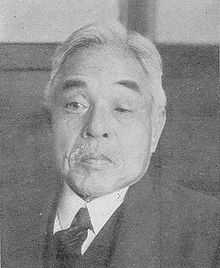Abe Isoo
| Abe Isoo | |
|---|---|
 | |
| Member of the House of Representatives | |
| In office 1928–1930 | |
| Constituency | Tokyo 2nd district |
| In office 1932–1940 | |
| Constituency | Tokyo 2nd district |
| Personal details | |
| Born | 4 February 1865[1][2][3] Fukuoka, Japan |
| Died | 10 February 1949 (aged 84)[1] Tokyo, Japan |
| Political party | Shakai Minshutō→ Shakai Minshūtō→ Shakai Taishūtō→ Kinrō Kokumintō (banned)→ Independent→ Japanese Socialist Party |
| Residence | Tokyo |
| Alma mater | Doshisha University, University of Berlin and Hartford Theological Seminary |
| Occupation | preacher |
| Religion | Christianity (Christian socialism)/Unitarian |
Abe Isoo (安部 磯雄, 4 February 1865 – 10 February 1949)[1][2][3] was a Japanese Christian socialist, parliamentarian and pacifist.
Early life and education
Abe was born in Fukuoka on 4 February 1865.[2][4] He studied at Doshisha University and abroad, including at the University of Berlin, before attending Hartford Theological Seminary in Hartford, Connecticut.[5] It was while he was studying in Hartford that he became interested in socialism.[1]
Career
After returning to Japan, in 1899,[1] Abe became a Unitarian preacher. He taught at the Waseda University starting in 1901, called Tokyo Semmon Gakko, at the time.[1] He would teach for 25 years.[1] In 1901 he helped to found the short-lived Japanese Social-Democratic party, which the government swiftly prohibited.
During the Russo-Japanese War, he advocated non-cooperation and participated in various early feminist movements. When the anti-war newspaper, Heimin Shimbun (People's Weekly News) was banned, he started his own magazine, Shinkigen (A New Era). He used this as a soapbox to promote parliamentary socialism.[1] In 1906, he played an instrumental role in founding the first Japanese Socialist Party, from which he advocated a Christian Socialist viewpoint. However, the government outlawed this party too in 1907. He dropped out of public life until after World War I, when he became active again.[1] He founded the Japanese Fabian Society, in 1921,[1] and in 1924, he became their first President. He resigned his teaching post to become the secretary-general of the Social Democratic Party.[1] In 1928, he was elected to the Japanese Diet, where he held a seat for five consecutive elections.[1] In 1932, he became a chairman of Shakai Taishuto (Social Mass Party).[1][4] He withdrew from politics in 1940 due to the increasing militaristic nature of the current government.[1] Abe's other claim to fame was that he was responsible for the emergence of baseball in Japan.[1][2]
See also
References
- ↑ 1.0 1.1 1.2 1.3 1.4 1.5 1.6 1.7 1.8 1.9 1.10 1.11 1.12 1.13 1.14 Hoiberg, Dale H., ed. (2010). "Abe Isoo". Encyclopedia Britannica. I: A-ak Bayes (15th ed.). Chicago, IL: Encyclopedia Britannica Inc. p. 23. ISBN 978-1-59339-837-8.
- ↑ 2.0 2.1 2.2 2.3 Castronova, Frank V., ed. (1998). Almanac of Famous People. I Biographies. Detroit, MI: Gale Research. p. 4.
- ↑ 3.0 3.1 There is uncertainty surrounding his birth date as some sources state that his day of birth is March 1, 1865.
- ↑ 4.0 4.1 Louis Frédéric; Käthe Roth (2002). Japan Encyclopedia. Harvard University Press. p. 902. ISBN 978-0-674-01753-5. Retrieved 6 January 2013.
- ↑ http://www.britannica.com/EBchecked/topic/992/Abe-Isoo